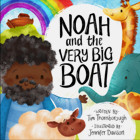
What stories from your childhood stuck with you?
Rising out of the regular media mush, two things left a deep impression on me from early childhood. Noggin the Nog and The Singing Ringing Tree. OK—I’ve just given away my age, because, depending on which side of 60 you are, you are either saying Huh? or shuddering with terror.
Both were children’s TV series shown in black and white (yes! before colour!) on the BBC, and both were adaptations of old mythic stories from other cultures, the first a Norse Saga, the second, an East German version of a Grimm Brothers fairy tale.

Faithful and fun retelling of the story of Noah and the flood for children 2-4 years old, showing how God saves his people and always keeps his promises.
What struck me most was the “otherness” of these stories. My six-year old mind immediately twigged that these were different from Stingray and Fireball XL5—sci-fi puppet shows created by Gerry Anderson. Exciting as these futuristic shows were to me, it was the weirdness of these other stories that had a greater, albeit unsettling, impact upon me. Why? Not just because the culture was different. But because they were prepared to go to places that are often whitewashed out of our own culture’s storytelling. Evil people were truly nasty, and were not redeemed at the end with the whole cast celebrating in a sing-along love-in. Peril was real. People died. The endings were not neatly rounded off. And the heroes had serious character flaws that went beyond the loveable and funny.
We have a story-telling industry that pumps out tales that keep things sweet for children—where everything is cutesy and kind, and the jeopardy that is an essential part of plot-making, is always resolved at the end. The kittens are rescued. And as heart warming, moral, entertaining and inspirational as these stories can be, even young children can discern the profound "added extra” when they see or read these darker, more “mythic” tales. Later generations felt it with The Dark Crystal, Lord of the Rings, The never-ending story (the horse dies! The Horse!), Watership Down (lovely bunnies—that get dismembered), and the infamous tunnel scene in the original Willy Wonka and the Chocolate Factory. They discern a depth and quality of truth in them that goes beyond the mundane everyday.
There is a significant role for stories that are uplifting, inspiring and positive. But the stories we tell to and share with children are also a way of introducing them to the realities of life outside the warm cocoon of the family. They prepare us for the realities of life where black and white are not the only moral colours; where choices are difficult; where evil sometimes appear to win; where people get sick and do not heal; where people die.
The “sugaring” of stories for children can happen with the way we re-tell Bible stories. There are a number of “standard” stories that publishers—both Christian and secular—churn out year after year. The ones involving animals mainly. But it's hard to find versions of these books that carry with them profound, and often quite dark, truths that the stories carry in scripture.
So we have Noah without a hint of the judgement that God visits upon the wicked earth. We have Daniel surviving the lions, but no mention of the fact that the plotters were then thrown into the den and eaten by the lions (and their wives and children). We have Jonah without a sniff of chapter 4—which is really the punchline to the whole story. And we have little David, and that animal Goliath—where the grim reality of this battle to the death in no-mans land are smoothed over.
But the Bible has, and should have, that sense of reality and otherness about it. It is set in another culture and at another time. It deals with the bitter realities of life. There is a gloriously happy ending for those who trust in Christ, but there is another ending that we need to take account of. Goliath dies. The world is justly erased in God’s flood-judgement. The plotters and their families are ripped apart by the lions that refused to maul Daniel. And grace abounds to the evil Ninevites, while the “hero” grumbles and complains that God is not as prejudiced and lacking in mercy as he is.
Of course, there are places we need to tread very carefully as we tell and read Bible stories to little ones. But let’s not hold back from giving the full story—even when we find it difficult and dark. Faithfully told, and creatively re-told, these God-inspired and true stories will have their Spirit-inspired effect on children, who will discern the otherness of a God who is both just, but also filled with grace and love towards his people.
The Very Best Bible Stories series combine, fun, interactive story-telling with a robust faithfulness to the biblical text. Noah, Jonah, Daniel and David and Goliath get the treatment, with beautiful illustrations by Jennifer Davison. Browse them here.